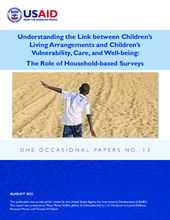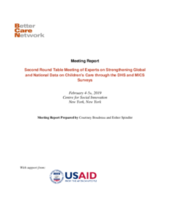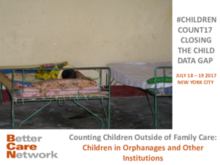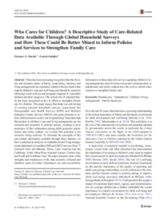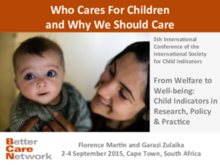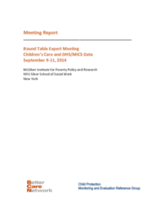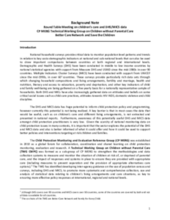BCN and its partners are working to advocate for better collection and analysis of data on children’s living and care arrangements in order to allow countries to identify trends and patterns in girls’ and boys’ care, monitor changes to their situation, and respond accordingly to strengthen family care and prevent unnecessary placement in out of home care.
Displaying 1 - 7 of 7
This paper examines the role that household surveys – such as the Demographic and Health Surveys (DHS) and the Multiple Indicator Cluster Surveys (MICS) – can play in increasing our understanding of the influence of living arrangements on children’s vulnerability, care, and well-being.
This report presents a summary of the presentations, discussions, and decision points made during a two-day round table meeting in New York on 4-5 February 2019, organized by the Better Care Network (BCN) and ICF with support from USAID, to determine how existing population-level surveys could be strengthened to improve global and national data on children’s care and wellbeing.
This presentation, delivered by Better Care Network Director Florence Martin at the 18-19 July #ChildrenCount17 conference, demonstrates the need for comprehensive national data systems, as well as what kind of data should be collected, barriers to thorough data collection, and examples of strong national-level efforts to collect comprehensive data on children living outside of family care.
This paper offers an analysis on orphanhood and living arrangements data based on available DHS and MICS surveys from 77 countries from sub-Saharan Africa, Latin America and the Caribbean, North Africa/West Asia/and Europe, Central Asia, and South and Southeast Asia.
Florence Martin, director of the Better Care Network, presented on the need for better data on children’s living and care arrangements at the 5th International Conference of the International Society for Child Indicators: “From Welfare to Well-being: Child Indicators in Research, Policy & Practice.”
The Better Care Network (BCN) and the Child Protection Monitoring and Evaluation Reference Group (MERG) organized a two-day round table meeting between 9-11 September 2014, to explore how data regarding the living and care situations of children can be better used to provide insight into their vulnerability, and to guide more targeted policies, services and interventions on their behalf.
The aim of this initiative is to inform the development of an inter-agency technical brief that explains what household level data is available through DHS and MICS that is critical to better understanding and monitoring of trends and patterns in children’s living arrangements and care status, and how the data can and should be extracted and used to inform policy and programmes at country and international levels.

